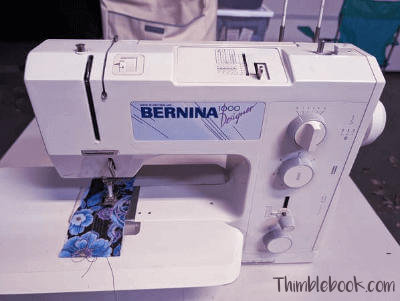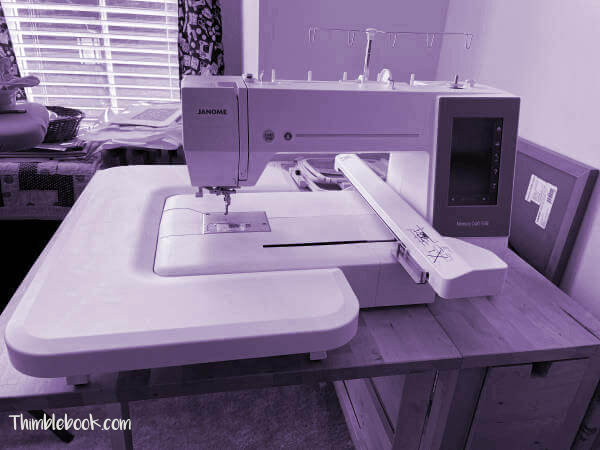How To Find A Good Second Hand Sewing Machine
*This post may include affiliate links, which allow me to make a small commission off your purchases. The money is earned at no additional cost to you.
In order to find a good second hand sewing machine, you need to know what to look for. I have created a YouTube video on the topic and have also written an extensive guide below.
Before buying a machine, you need to know…
…the main tasks you would like to complete on the sewing machine. Home sewing machines are intended for multipurpose use, while industrials are made to do one tasks exceptionally well. Since industrial machines are only made for completing one tasks, you’ll always find a pro shop filled with many large industrial machines.
While home sewing enthusiasts don’t have space for massive industrial machines, they still want to get professional quality out of their sewing projects. For this reason, most sewing enthusiasts have a multi-purpose home machine that shines in one area more than others. Thus, you will need to shop for a machine that works best for completing the main project you would like to do on your machine.
Sewing enthusiasts fall into 4 main categories:
- Quilters
- Bag Makers
- Garment Makers
- Embroiderers
I have made a list, which includes some of the best vintage machines for each category. If you are interested in going vintage, go check it out.
For those of you who are new to the game of sewing and uncertain about…
…where you fit in, know it’s ok. Select one project you would like to complete and shop with this project in mind. If you find your self wanting to do something different later, you can always add another good second hand machine or even trade your existing machine for another.
I bet your wondering what to look for in a good second hand sewing machine…
… built for your specific sewing tasks. I have mentioned this in other articles, but I will mention it again.

Bernina 1000 Designer from Craigslist. The built in buttonhole, stitches, and plate make it ideal for garment making.
For garment making you need:
- Straight & Zigzag
- A needle plate suitable for working with lightweight materials
- Nice buttonhole stitch(s)

Janome 550E Ideal for doing home embroidery projects. This is from Craigslist.
With Embroidery, you’ll need:
- Feed Dog Drop
- Extra nice straight stitch
- Zigzag for satin stitching
- Multi- file compatibility
- USB Port
- Upgradable Software
- Large enough embroidery window

Brother PQ1500SL from FB marketplace. Ideal for quilting or some light bag making.
Interested in Quilting? Search for a machine with a:
- Larger harp area
- Feed dog drop
- Extra strength for piercing multiple layers

Image from FB marketplace Juki-TL98Q ideal for home hobby bag making or even quilting.
For Bag Making you’ll need:
- Extra piercing power
- Longer Stitch length for top stitching
- Great straight stitch
Look for good second hand machines on/at…
- Craigslist
- Offer Up
- FB Marketplace
- Shopgoodwill.com
- Mercari
- Local thrift stores
- Kenssewingcenter.com (Preowned and factory refurbished machines here)
- Your local sewing center (They often have trade-ins available)
Search for model numbers to find out the specifics about the machine.
Once you find out the model number, do a little research on it to find information. A basic google search provides results on Singer, Kenmore, Viking, Pfaff, and Elna. However, it is often harder to find information about other brands. You can find information about other brands by visiting forms like:
Find out about the availability of parts or the lack thereof.
In America, it is very easy to find replacement parts for Singer or Kenmore machines. However, it takes a lot of digging to find parts for other kinds of machines. But, the good news is that vintage Japanese Singer class 15 clones take Singer parts.
A machine is a little less desirable when the parts aren’t readily available. However, I have brought home some great second hand machines with hard to find parts!
Check out the condition of the machine.
Here’s my criteria for checking the condition of a machine.
- Are the wires good? *It is easy to change out wires on sewing machines. But, it is much more difficult on a machine with a potted motor. So, take it into consideration before getting a machine with a potted motor.
- Does the machine have all of its parts on it. *DO NOT BUY A MACHINE WITH MISSING BODY PARTS. You will be disappointed as it is very hard to find these parts in the second hand market.
- Are all the accessories included. Accessories include things like presser feet, knee lifts, etc. You can go without some of the accessories. But, consider how much it would cost to replace these accessories before making a purchase.
- Does the machine have abundant rust, mildew, or bubbling paint. Skip the machine if you find this to be the case because this means there is water damage present.
- For computerized machines, make sure you know the service history and stitch count.
With all the above mentioned things considered, …
… you are now prepared to buy a good preowned sewing machine! 🙂

No Comments